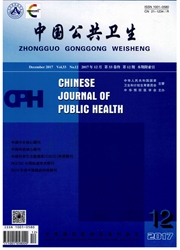

 中文摘要:
中文摘要:
目的初步探讨军团菌感染与Toll样受体4(Toll-like receptor,TLR4)基因(2244G→A)及(2299A→G)多态性的关系。方法采用聚合酶链反应(PCR)扩增肺部感染患者痰液及尿液中军团菌属特异性16SrRNA基因,酶免疫检测法(EIA)检测尿液中血清1型嗜肺军团菌抗原;采用聚合酶链-限制性片段长度多态性(PCR-RFLP)技术检测25例军团菌感染者(病例组)、44例其他非革兰氏阴性菌引起的肺部感染者(患者对照组)和47名健康体检者(健康对照组)的TLR4基因(2244G→A)及(2299A→G)位点的多态性。结果病例组、患者对照组、健康对照组TLR4(2244G→A)位点基因型和等位基因频率差异有统计学意义(χ2=17.234,P=0.002;χ2=15.332,P〈0.001);经两两比较,TLR4(2244G→A)位点基因型和等位基因频率病例组和患者对照组均高于健康对照组(P〈0.05),病例组与患者对照组比较差异无统计学意义(P〉0.05);3组TLR4(2299A→G)位点基因型和等位基因频率差异无统计学意义(P〉0.05)。结论 TLR4基因(2244G→A)位点多态性与军团菌和其他非革兰氏阴性菌易感性可能有关。
 英文摘要:
英文摘要:
Objective To investigate the relationship between Toll-like receptor4(TLR4) gene(2244G→A) or(2299A→G) polymorphism and Legionella infection. Methods The 16Sr gene of Legionella in sputum samples was amplified with polymerase chain reaction(PCR) and the antigen of Legionella pneumophila serogroup 1 strain was detcted with enzyme immune assay(EIA) for pulmonary infection patients.Polymerase chain reaction-restriction fragment length polymorphism(PCR-RFLP) was used to analyze the TLR4(2244G→A) and(2299A→G) gene polymorphism in 25 Legionella infected patients,44 non-gram-negative bacterial infected patients,and 47 healthy individuals. Results There were significant differences among the three groups in TLR4(2244G→A) polymorphism(χ2=17.234,P=0.002;χ2=15.332,P0.001).There was a significant difference between healthy controls and other groups in TLR4(2244G→A) polymorphism(P0.05).There was no significant difference between Legionella infected patients and case controls(P0.05).There was no significant difference among the three groups in TLR4(2299A→G) polymorphism(P0.05). Conclusion TLR4(2244G→A) polymorphism is associated with the susceptibility of Legionella and other non-gram-negative bacterial infection.
 同期刊论文项目
同期刊论文项目
 同项目期刊论文
同项目期刊论文
 期刊信息
期刊信息
